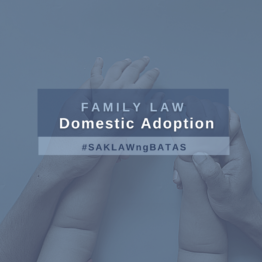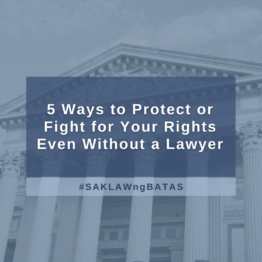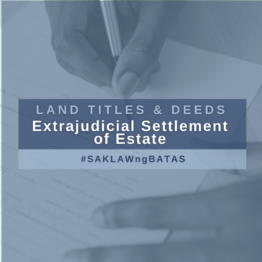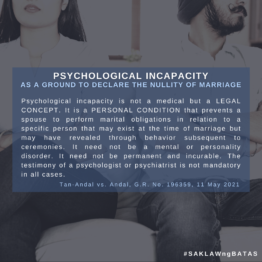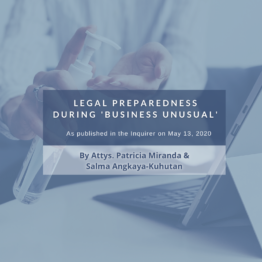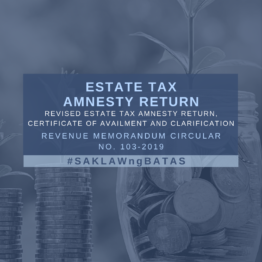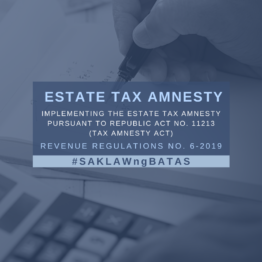Ruby Shelter Builders and Realty Development Corporation v. Formaran III, G.R. No. 175914, [February 10, 2009], 598 PHIL 105-131
In Manchester Development Corporation v. Court of Appeals, 28 the Court explicitly pronounced that “[t]he court acquires jurisdiction over any case only upon the payment of the prescribed docket fee”. Hence, the payment of docket fees is not only mandatory, but also jurisdictional.
In Sun Insurance Office, Ltd. (SIOL) v. Asuncion, 29 the Court laid down guidelines for the implementation of its previous pronouncement in Manchester under particular circumstances, to wit:
1. It is not simply the filing of the complaint or appropriate initiatory pleading, but the payment of the prescribed docket fee, that vests a trial court with jurisdiction over the subject matter or nature of the action. Where the filing of the initiatory pleading is not accompanied by payment of the docket fee, the court may allow payment of the fee within a reasonable time but in no case beyond the applicable prescriptive or reglementary period.
2. The same rule applies to permissive counterclaims, third-party claims and similar pleadings, which shall not be considered filed until and unless the filing fee prescribed therefor is paid. The court may also allow payment of said fee within a reasonable time but also in no case beyond its applicable prescriptive or reglementary period.
3. Where the trial court acquires jurisdiction over a claim by the filing of the appropriate pleading and payment of the prescribed filing fee but, subsequently, the judgment awards a claim not specified in the pleading, or if specified the same has been left for determination by the court, the additional filing fee therefor shall constitute a lien on the judgment. It shall be the responsibility of the Clerk of Court or his duly authorized deputy to enforce said lien and assess and collect the additional fee. aIHCSA
In the Petition at bar, the RTC found, and the Court of Appeals affirmed, that petitioner did not pay the correct amount of docket fees for Civil Case No. 2006-0030. According to both the trial and appellate courts, petitioner should pay docket fees in accordance with Section 7 (a), Rule 141 of the Rules of Court, as amended. Consistent with the liberal tenor of Sun Insurance, the RTC, instead of dismissing outright petitioner’s Complaint in Civil Case No. 2006-0030, granted petitioner time to pay the additional docket fees. Despite the seeming munificence of the RTC, petitioner refused to pay the additional docket fees assessed against it, believing that it had already paid the correct amount before, pursuant to Section 7 (b) (1), Rule 141 of the Rules of Court, as amended.
Relevant to the present controversy are the following provisions under Rule 141 of the Rules of Court, as amended by A.M. No. 04-2-04-SC 30 and Supreme Court Amended Administrative Circular No. 35-2004: 31
SEC. 7. Clerks of Regional Trial Courts. —
(a) For filing an action or a permissive OR COMPULSORY counterclaim, CROSS-CLAIM, or money claim against an estate not based on judgment, or for filing a third-party, fourth-party, etc. complaint, or a complaint-in-intervention, if the total sum claimed, INCLUSIVE OF INTERESTS, PENALTIES, SURCHARGES, DAMAGES OF WHATEVER KIND, AND ATTORNEY’S FEES, LITIGATION EXPENSES AND COSTS and/or in cases involving property, the FAIR MARKET value of the REAL property in litigation STATED IN THE CURRENT TAX DECLARATION OR CURRENT ZONAL VALUATION OF THE BUREAU OF INTERNAL REVENUE, WHICHEVER IS HIGHER, OR IF THERE IS NONE, THE STATED VALUE OF THE PROPERTY IN LITIGATION OR THE VALUE OF THE PERSONAL PROPERTY IN LITIGATION OR THE VALUE OF THE PERSONAL PROPERTY IN LITIGATION AS ALLEGED BY THE CLAIMANT, is:
[Table of fees omitted.]If the action involves both a money claim and relief pertaining to property, then THE fees will be charged on both the amounts claimed and value of property based on the formula prescribed in this paragraph a.
(b) For filing:
1. Actions where the value of the subject matter cannot be estimated
2. Special civil actions, except judicial foreclosure of mortgage, EXPROPRIATION PROCEEDINGS, PARTITION AND QUIETING OF TITLE which will *
3. All other actions not involving property
[Table of fees omitted.]The docket fees under Section 7 (a), Rule 141, in cases involving real property depend on the fair market value of the same: the higher the value of the real property, the higher the docket fees due. In contrast, Section 7 (b) (1), Rule 141 imposes a fixed or flat rate of docket fees on actions incapable of pecuniary estimation.
In order to resolve the issue of whether petitioner paid the correct amount of docket fees, it is necessary to determine the true nature of its Complaint. The dictum adhered to in this jurisdiction is that the nature of an action is determined by the allegations in the body of the pleading or Complaint itself, rather than by its title or heading. 32 However, the Court finds it necessary, in ascertaining the true nature of Civil Case No. 2006-0030, to take into account significant facts and circumstances beyond the Complaint of petitioner, facts and circumstances which petitioner failed to state in its Complaint but were disclosed in the preliminary proceedings before the court a quo.
Petitioner persistently avers that its Complaint in Civil Case No. 2006-0030 is primarily for the annulment of the Deeds of Absolute Sale. Based on the allegations and reliefs in the Complaint alone, one would get the impression that the titles to the subject real properties still rest with petitioner; and that the interest of respondents Tan and Obiedo in the same lies only in the Deeds of Absolute Sale sought to be annulled.
What petitioner failed to mention in its Complaint was that respondents Tan and Obiedo already had the Memorandum of Agreement, which clearly provided for the execution of the Deeds of Absolute Sale, registered on the TCTs over the five parcels of land, then still in the name of petitioner. After respondents Tan and Obiedo had the Deeds of Absolute Sale notarized on 3 January 2006 and presented the same to Register of Deeds for Naga City on 8 March 2006, they were already issued TCTs over the real properties in question, in their own names. Respondents Tan and Obiedo have also acquired possession of the said properties, enabling them, by petitioner’s own admission, to demolish the improvements thereon.
It is, thus, suspect that petitioner kept mum about the afore-mentioned facts and circumstances when they had already taken place before it filed its Complaint before the RTC on 16 March 2006. Petitioner never expressed surprise when such facts and circumstances were established before the RTC, nor moved to amend its Complaint accordingly. Even though the Memorandum of Agreement was supposed to have long been registered on its TCTs over the five parcels of land, petitioner did not pray for the removal of the same as a cloud on its title. In the same vein, although petitioner alleged that respondents Tan and Obiedo forcibly took physical possession of the subject real properties, petitioner did not seek the restoration of such possession to itself. And despite learning that respondents Tan and Obiedo already secured TCTs over the subject properties in their names, petitioner did not ask for the cancellation of said titles. The only logical and reasonable explanation is that petitioner is reluctant to bring to the attention of the Court certain facts and circumstances, keeping its Complaint safely worded, so as to institute only an action for annulment of Deeds of Absolute Sale. Petitioner deliberately avoided raising issues on the title and possession of the real properties that may lead the Court to classify its case as a real action.
No matter how fastidiously petitioner attempts to conceal them, the allegations and reliefs it sought in its Complaint in Civil Case No. 2006-0030 appears to be ultimately a real action, involving as they do the recovery by petitioner of its title to and possession of the five parcels of land from respondents Tan and Obiedo. AcSEHT
A real action is one in which the plaintiff seeks the recovery of real property; or, as indicated in what is now Section 1, Rule 4 of the Rules of Court, a real action is an action affecting title to or recovery of possession of real property. 33
Section 7, Rule 141 of the Rules of Court, prior to its amendment by A.M. No. 04-2-04-SC, had a specific paragraph governing the assessment of the docket fees for real action, to wit:
In a real action, the assessed value of the property, or if there is none, the estimated value thereof shall be alleged by the claimant and shall be the basis in computing the fees.
It was in accordance with the afore-quoted provision that the Court, in Gochan v. Gochan, 34 held that although the caption of the complaint filed by therein respondents Mercedes Gochan, et al. with the RTC was denominated as one for “specific performance and damages”, the relief sought was the conveyance or transfer of real property, or ultimately, the execution of deeds of conveyance in their favor of the real properties enumerated in the provisional memorandum of agreement. Under these circumstances, the case before the RTC was actually a real action, affecting as it did title to or possession of real property. Consequently, the basis for determining the correct docket fees shall be the assessed value of the property, or the estimated value thereof as alleged in the complaint. But since Mercedes Gochan failed to allege in their complaint the value of the real properties, the Court found that the RTC did not acquire jurisdiction over the same for non-payment of the correct docket fees.
Likewise, in Siapno v. Manalo, 35 the Court disregarded the title/denomination of therein plaintiff Manalo’s amended petition as one for Mandamus with Revocation of Title and Damages; and adjudged the same to be a real action, the filing fees for which should have been computed based on the assessed value of the subject property or, if there was none, the estimated value thereof. The Court expounded in Siapno that:
In his amended petition, respondent Manalo prayed that NTA’s sale of the property in dispute to Standford East Realty Corporation and the title issued to the latter on the basis thereof, be declared null and void. In a very real sense, albeit the amended petition is styled as one for “Mandamus with Revocation of Title and Damages”, it is, at bottom, a suit to recover from Standford the realty in question and to vest in respondent the ownership and possession thereof. In short, the amended petition is in reality an action in res or a real action. Our pronouncement in Fortune Motors (Phils.), Inc. vs. Court of Appeals is instructive. There, we said:
A prayer for annulment or rescission of contract does not operate to efface the true objectives and nature of the action which is to recover real property. (Inton, et al., v. Quintan, 81 Phil. 97, 1948)
An action for the annulment or rescission of a sale of real property is a real action. Its prime objective is to recover said real property. (Gavieres v. Sanchez, 94 Phil. 760, 1954)
An action to annul a real estate mortgage foreclosure sale is no different from an action to annul a private sale of real property. (Muñoz v. Llamas, 87 Phil. 737, 1950).
While it is true that petitioner does not directly seek the recovery of title or possession of the property in question, his action for annulment of sale and his claim for damages are closely intertwined with the issue of ownership of the building which, under the law, is considered immovable property, the recovery of which is petitioner’s primary objective. The prevalent doctrine is that an action for the annulment or rescission of a sale of real property does not operate to efface the fundamental and prime objective and nature of the case, which is to recover said real property. It is a real action.
Unfortunately, and evidently to evade payment of the correct amount of filing fee, respondent Manalo never alleged in the body of his amended petition, much less in the prayer portion thereof, the assessed value of the subject res, or, if there is none, the estimated value thereof, to serve as basis for the receiving clerk in computing and arriving at the proper amount of filing fee due thereon, as required under Section 7 of this Court’s en banc resolution of 04 September 1990 (Re: Proposed Amendments to Rule 141 on Legal Fees).
Even the amended petition, therefore, should have been expunged from the records.
In fine, we rule and so hold that the trial court never acquired jurisdiction over its Civil Case No. Q-95-24791. 36
It was in Serrano v. Delica, 37 however, that the Court dealt with a complaint that bore the most similarity to the one at bar. Therein respondent Delica averred that undue influence, coercion, and intimidation were exerted upon him by therein petitioners Serrano, et al. to effect transfer of his properties. Thus, Delica filed a complaint before the RTC against Serrano, et al., praying that the special power of attorney, the affidavit, the new titles issued in the names of Serrano, et al., and the contracts of sale of the disputed properties be cancelled; that Serrano, et al. be ordered to pay Delica, jointly and severally, actual, moral and exemplary damages in the amount of P200,000.00, as well as attorney’s fee of P200,000.00 and costs of litigation; that a TRO and a writ of preliminary injunction be issued ordering Serrano, et al. to immediately restore him to his possession of the parcels of land in question; and that after trial, the writ of injunction be made permanent. The Court dismissed Delica’s complaint for the following reasons:
A careful examination of respondent’s complaint is that it is a real action. In Paderanga vs. Buissan, we held that “in a real action, the plaintiff seeks the recovery of real property, or, as stated in Section 2(a), Rule 4 of the Revised Rules of Court, a real action is one ‘affecting title to real property or for the recovery of possession of, or for partition or condemnation of, or foreclosure of a mortgage on a real property.'”
Obviously, respondent’s complaint is a real action involving not only the recovery of real properties, but likewise the cancellation of the titles thereto.
Considering that respondent’s complaint is a real action, the Rule requires that “the assessed value of the property, or if there is none, the estimated value thereof shall be alleged by the claimant and shall be the basis in computing the fees.” ECSHAD
We note, however, that neither the “assessed value” nor the “estimated value” of the questioned parcels of land were alleged by respondent in both his original and amended complaint. What he stated in his amended complaint is that the disputed realties have a “BIR zonal valuation” of P1,200.00 per square meter. However, the alleged “BIR zonal valuation” is not the kind of valuation required by the Rule. It is the assessed value of the realty. Having utterly failed to comply with the requirement of the Rule that he shall allege in his complaint the assessed value of his real properties in controversy, the correct docket fee cannot be computed. As such, his complaint should not have been accepted by the trial court. We thus rule that it has not acquired jurisdiction over the present case for failure of herein respondent to pay the required docket fee. On this ground alone, respondent’s complaint is vulnerable to dismissal. 38
Brushing aside the significance of Serrano, petitioner argues that said decision, rendered by the Third Division of the Court, and not by the Court en banc, cannot modify or reverse the doctrine laid down in Spouses De Leon v. Court of Appeals. 39 Petitioner relies heavily on the declaration of this Court in Spouses De Leon that an action for annulment or rescission of a contract of sale of real property is incapable of pecuniary estimation.
The Court, however, does not perceive a contradiction between Serrano and the Spouses De Leon. The Court calls attention to the following statement in Spouses De Leon: “A review of the jurisprudence of this Court indicates that in determining whether an action is one the subject matter of which is not capable of pecuniary estimation, this Court has adopted the criterion of first ascertaining the nature of the principal action or remedy sought”. Necessarily, the determination must be done on a case-to-case basis, depending on the facts and circumstances of each. What petitioner conveniently ignores is that in Spouses De Leon, the action therein that private respondents instituted before the RTC was “solely for annulment or rescission” of the contract of sale over a real property. 40 There appeared to be no transfer of title or possession to the adverse party. Their complaint simply prayed for:
1. Ordering the nullification or rescission of the Contract of Conditional Sale (Supplementary Agreement) for having violated the rights of plaintiffs (private respondents) guaranteed to them under Article 886 of the Civil Code and/or violation of the terms and conditions of the said contract.
2. Declaring void ab initio the Deed of Absolute Sale for being absolutely simulated; and
3. Ordering defendants (petitioners) to pay plaintiffs (private respondents) attorney’s fees in the amount of P100,000.00. 41
As this Court has previously discussed herein, the nature of Civil Case No. 2006-0030 instituted by petitioner before the RTC is closer to that of Serrano, rather than of Spouses De Leon, hence, calling for the application of the ruling of the Court in the former, rather than in the latter.
It is also important to note that, with the amendments introduced by A.M. No. 04-2-04-SC, which became effective on 16 August 2004, the paragraph in Section 7, Rule 141 of the Rules of Court, pertaining specifically to the basis for computation of docket fees for real actions was deleted. Instead, Section 7 (1) of Rule 141, as amended, provides that “in cases involving real property, the FAIR MARKET value of the REAL property in litigation STATED IN THE CURRENT TAX DECLARATION OR CURRENT ZONAL VALUATION OF THE BUREAU OF INTERNAL REVENUE, WHICH IS HIGHER, OR IF THERE IS NONE, THE STATED VALUE OF THE PROPERTY IN LITIGATION . . .” shall be the basis for the computation of the docket fees. Would such an amendment have an impact on Gochan, Siapno, and Serrano? The Court rules in the negative.
A real action indisputably involves real property. The docket fees for a real action would still be determined in accordance with the value of the real property involved therein; the only difference is in what constitutes the acceptable value. In computing the docket fees for cases involving real properties, the courts, instead of relying on the assessed or estimated value, would now be using the fair market value of the real properties (as stated in the Tax Declaration or the Zonal Valuation of the Bureau of Internal Revenue, whichever is higher) or, in the absence thereof, the stated value of the same.
In sum, the Court finds that the true nature of the action instituted by petitioner against respondents is the recovery of title to and possession of real property. It is a real action necessarily involving real property, the docket fees for which must be computed in accordance with Section 7 (1), Rule 141 of the Rules of Court, as amended. The Court of Appeals, therefore, did not commit any error in affirming the RTC Orders requiring petitioner to pay additional docket fees for its Complaint in Civil Case No. 2006-0030.
The Court does not give much credence to the allegation of petitioner that if the judgment of the Court of Appeals is allowed to stand and not rectified, it would result in grave injustice and irreparable injury to petitioner in view of the prohibitive amount assessed against it. It is a sweeping assertion which lacks evidentiary support. Undeniably, before the Court can conclude that the amount of docket fees is indeed prohibitive for a party, it would have to look into the financial capacity of said party. It baffles this Court that herein petitioner, having the capacity to enter into multi-million transactions, now stalls at paying P720,392.60 additional docket fees so it could champion before the courts its rights over the disputed real properties. Moreover, even though the Court exempts individuals, as indigent or pauper litigants, from paying docket fees, it has never extended such an exemption to a corporate entity.
WHEREFORE, premises considered, the instant Petition for Review is hereby DENIED. The Decision, dated 22 November 2006, of the Court of Appeals in CA-G.R. SP No. 94800, which affirmed the Orders dated 24 March 2006 and 29 March 2006 of the RTC, Branch 22, of Naga City, in Civil Case No. RTC-2006-0030, ordering petitioner Ruby Shelter Builders and Realty Development Corporation to pay additional docket/filing fees, computed based on Section 7 (a), Rule 141 of the Rules of Court, as amended, is hereby AFFIRMED. Costs against the petitioner.

